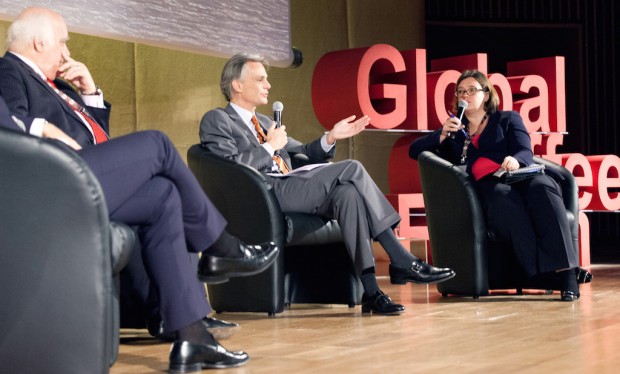Beverage companies will need to take a more active role in sharing value throughout the coffee supply chain, especially in the form of long-term relationships with farmers, if those companies have any hope of maintaining long-term profitability. This was the driving message of a speech delivered by Nestlé Nespresso CEO Jean-Marc Duvoisin at the recent Global Coffee Forum presented by the International Coffee Organization in Milan, Italy.
Duviosin repeatedly stressed that protecting farmers is not merely a humanitarian issue, but a critical business issue if companies selling coffee at the other end of the supply chain want to ensure long-term supply availability, and achieve improved consistency and quality control. In short, coffee companies will not be able to sell a product if they have no supply.
According to Duvoisin, the price volatility in the commodities market that has characterized the coffee trade since the collapse of the International Coffee Agreement in 1989, combined with other current market forces, has created an unstable and unsustainable global market since coffee farming is in many cases no longer profitable.
“One of the biggest challenges of our time is mitigating the negative impacts of price volatility through business models which protect the farmer and our supply,” Duvoisin said on Sept. 30. “Fluctuations in the price of coffee pose a persistent challenge to businesses interests like ours, but also to the stability of farmers’ incomes. After the crisis, some farmers became extremely vulnerable to the free market volatility, experiencing massive drops in income, abandoning their land or clearing it for more profitable crops, or engaging in illegal activity. Price volatility remains one of the biggest challenges to this day of this industry.”
Duvoisin naturally cited Nespresso’s own AAA Sustainable Quality Program as a model for value sharing throughout the supply chain, while urging other coffee industry leaders — particularly beverage companies such as coffee roasters — to engage in long-term relationships with coffee producers, rather than merely following lower prices through the commodities market. These kinds of long-term purchase commitments, he said, can serve to de-commoditize coffee, protecting it from price volatility while allowing farmers to achieve the kind of long-term profitability that can safeguard supply.
“Right now, there is a Colombian coffee farmer struggling to balance his books. He is faced with fluctuating production costs, and buyers who behave in an unpredictable way, buy at spot price, and change origins of coffee supplies when prices are lower someplace else,” Duvoisin said. “Creating a reliable cash flow is difficult. Maybe day-to-day his children aren’t starving, but he can’t effectively plan his business one year to the next, let alone think about retirement savings or passing the farm on to his children. Many of these children are today leaving for the city, seeing no future in coffee farming.
“What can we do? What business approach can we take to improve that farmer’s situation? What can we do to ensure coffee farming remains attractive to them, so we can ensure consistent supplies far into the future? It is a pretty stark reality, but one that everyone of us in this room needs to recognize: if farmers are not sustainable, we cannot be sustainable ourselves as a business.”
Nick Brown
Nick Brown is the editor of Daily Coffee News by Roast Magazine.
Comment
2 Comments
Comments are closed.







Good friends are hard to find, good people, harder still. Definitely good discussion though.
Great read – long term sustainability is what matters most. It would be impossible to provide the same high-quality products to consumers without the farmers who grow the crop!
http://www.taliausa.com